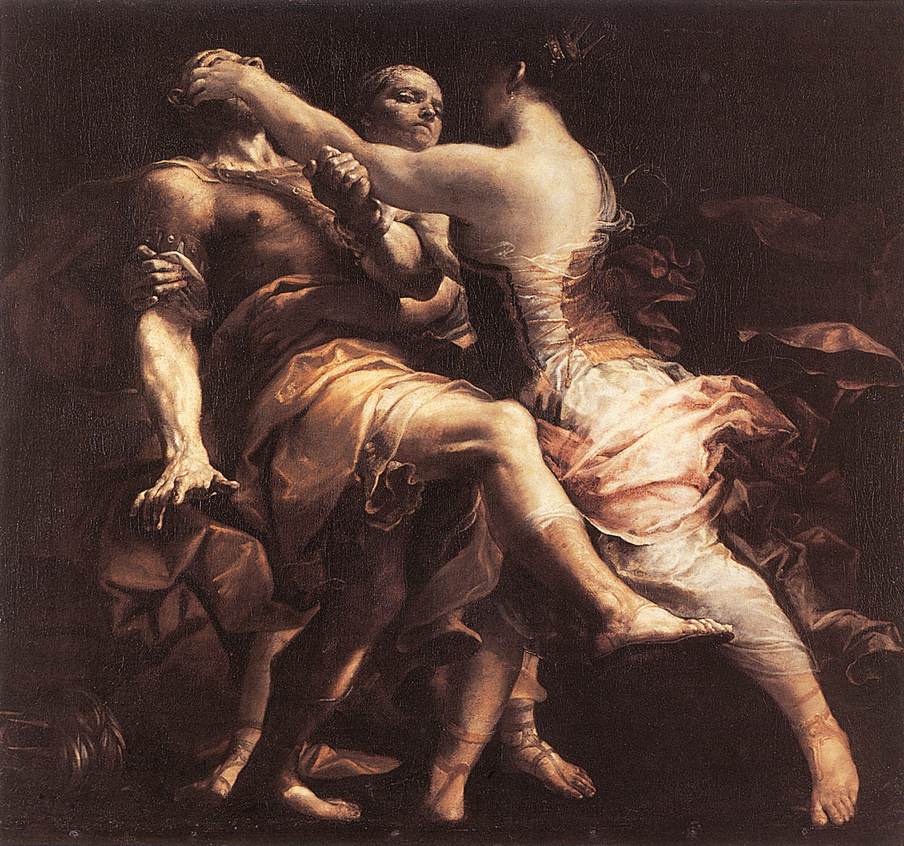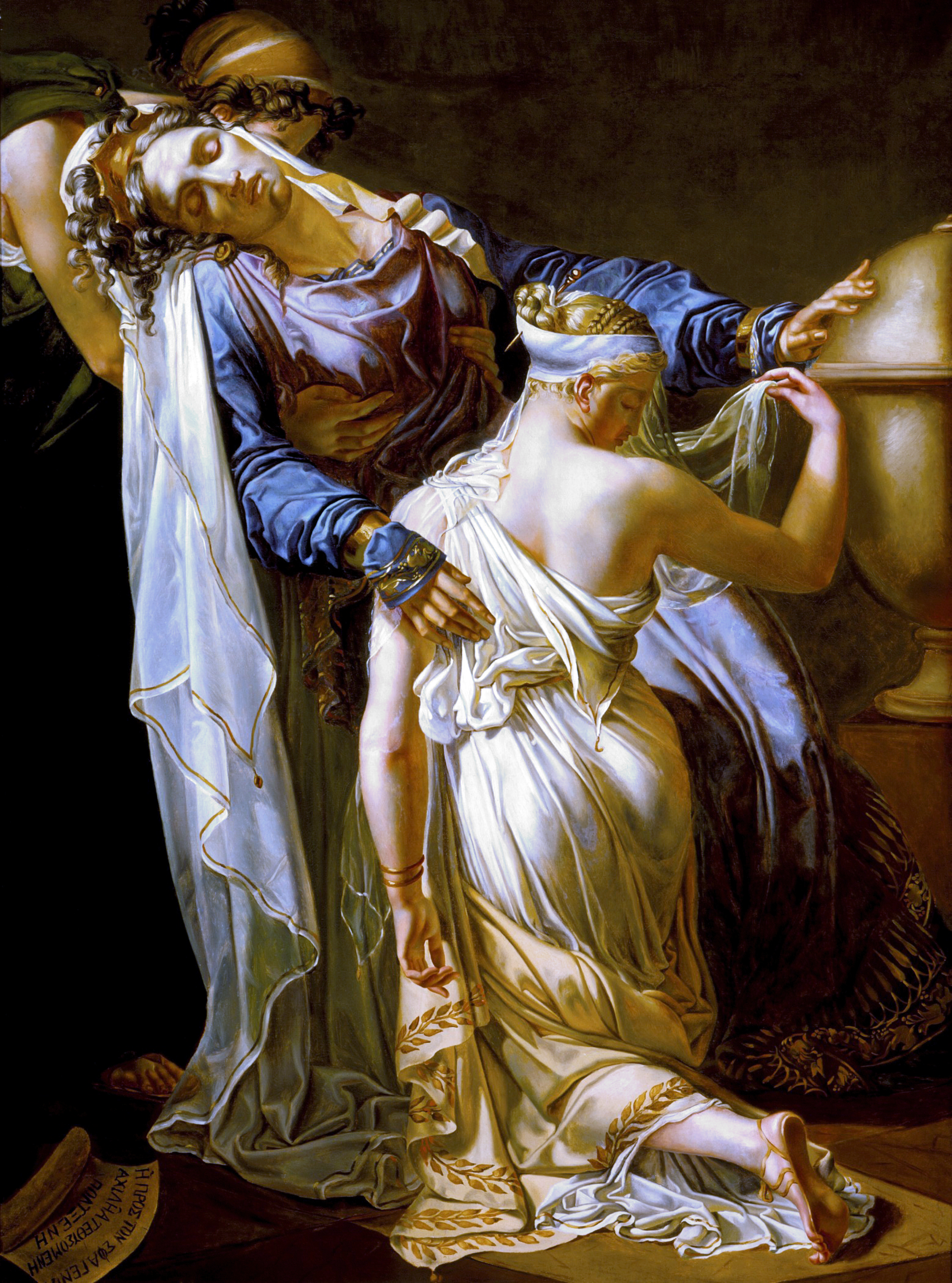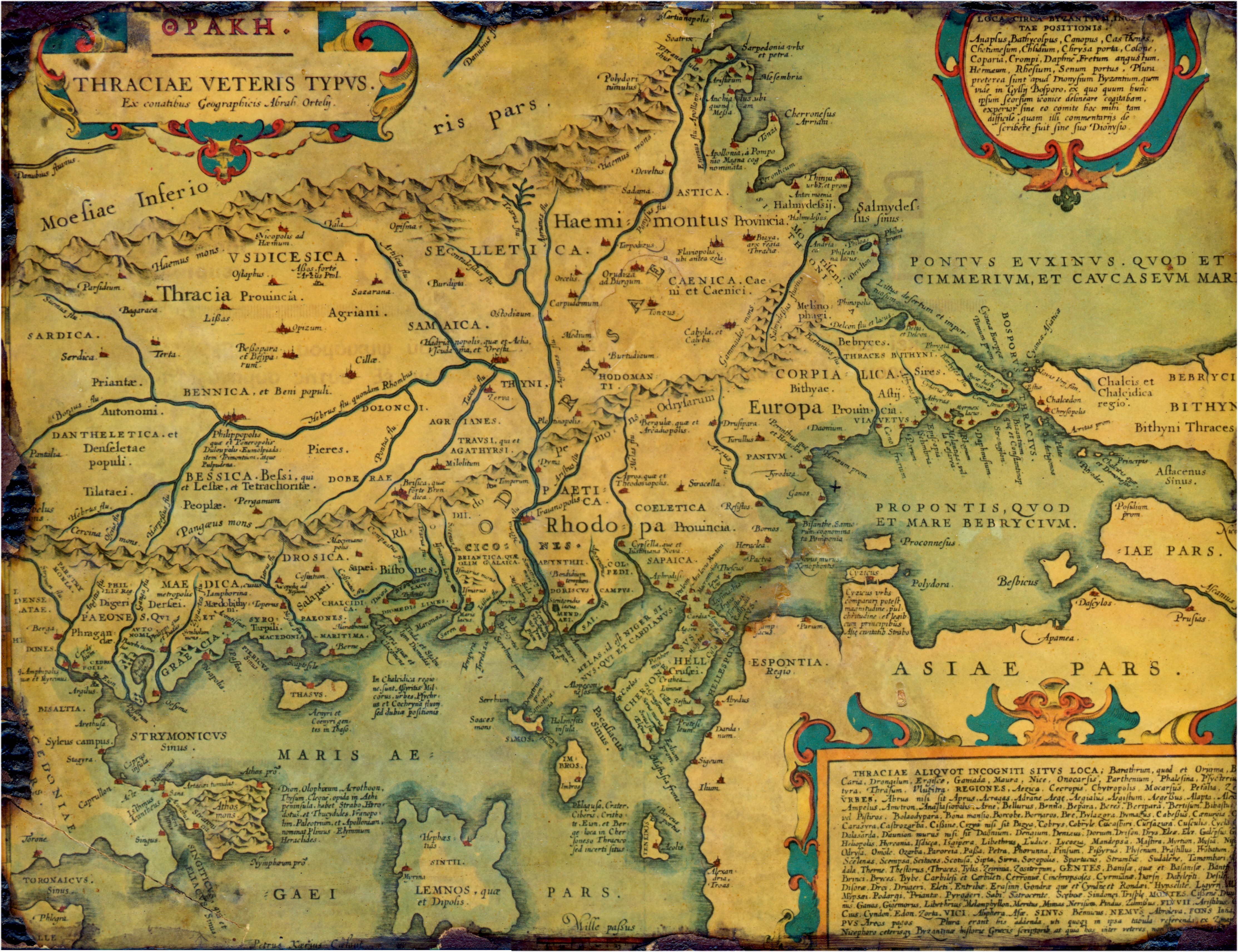|
Polymestor
In Greek mythology, Polymestor or Polymnestor ( grc, Πολυμ(ν)ήστωρ) was a king of the Bistonians in Thrace. Polymestor appears in Euripides' play ''Hecuba'' and in the Ovidian myth "Hecuba, Polyxena and Polydorus". Polymestor was also the name of a Greek king of Arcadia. Family Polymestor was the husband of Ilione, the eldest daughter of King Priam and Queen Hecuba of Troy. The couple had only one son, Deipylus.Hyginus, ''Fabulae'' 109 Mythology During the Trojan War, King Priam was frightened for his youngest son Polydorus's safety since Polydorus could not fight for himself. Priam sent the child, along with gifts of jewelry and gold, to the court of King Polymestor to keep him away from the fighting. After Troy fell, Polymestor betrayed Priam and threw Polydorus into the ocean in order to keep the treasures for himself. Hecuba, Polydorus' mother, found the body and discovered the treachery. She asked Agamemnon to bring Polymestor to her. Agamemnon complied, mot ... [...More Info...] [...Related Items...] OR: [Wikipedia] [Google] [Baidu] |
Hecuba (play)
''Hecuba'' ( grc, Ἑκάβη, ''Hekabē'') is a tragedy by Euripides, written . It takes place after the Trojan War but before the Greeks have departed Troy (roughly the same time as '' The Trojan Women'', another play by Euripides). The central figure is Hecuba, wife of King Priam, formerly queen of the now-fallen city. It depicts Hecuba's grief over the death of her daughter Polyxena and the revenge she takes for the murder of her youngest son, Polydorus. Plot In the play's opening, the ghost of Polydorus tells how when the war threatened Troy, he was sent to King Polymestor of Thrace for safekeeping, with gifts of gold and jewelry. But when Troy lost the war, Polymestor treacherously murdered Polydorus, and seized the treasure. Polydorus has foreknowledge of many of the play's events and haunted his mother's dreams the night before. The events take place on the coast of Thrace, as the Greek navy returns home from Troy. The Trojan queen Hecuba, now enslaved by the Greeks, mo ... [...More Info...] [...Related Items...] OR: [Wikipedia] [Google] [Baidu] |
Polydorus (son Of Priam)
Polydorus or Polydoros (; grc, Πολύδωρος, i.e. "many-gift d) is the youngest son of Priam in the mythology of the Trojan War. While Homer states his mother is Laothoe, later sources state his mother is Hecuba. Polydorus is an example of the fluid nature of myth, as his role and story vary significantly in different traditions and sources. Mythology In the ''Iliad'' In Homer's Greek epic the ''Iliad'', Polydorus is depicted briefly as a foe to Achilles. According to this source, Polydorus was the youngest son of Priam, and thus his father would not let him fight. Achilles, however, sees him on the battlefield showing off his great speed running through the lines and spears him, ending his life. Seeing his brother Polydorus’ death causes Hector to challenge Achilles. In ''Hecuba'' and ''Metamorphoses'' In Euripides' tragedy '' Hecuba'', the ghost of Polydorus is a character, and his death is the cause of the main conflict of the play. Polydorus’ ghost p ... [...More Info...] [...Related Items...] OR: [Wikipedia] [Google] [Baidu] |
Hecuba
Hecuba (; also Hecabe; grc, Ἑκάβη, Hekábē, ) was a queen in Greek mythology, the wife of King Priam of Troy during the Trojan War. Description Hecuba was described by the chronicler Malalas in his account of the ''Chronography'' as "dark, good eyes, full grown, long nose, beautiful, generous, talkative, calm". Meanwhile, in the account of Dares the Phrygian, she was illustrated as ". . .beautiful, her figure large, her complexion dark. She thought like a man and was pious and just." Family Parentage Ancient sources vary as to the parentage of Hecuba. According to Homer, Hecuba was the daughter of King Dymas of Phrygia, but Euripides and Virgil write of her as the daughter of the Thracian king Cisseus. The mythographers Pseudo-Apollodorus and Hyginus leave open the question which of the two was her father, with Pseudo-Apollodorus adding a third alternative option: Hecuba's parents could as well be the river god Sangarius and Metope. Some versions from non-extant ... [...More Info...] [...Related Items...] OR: [Wikipedia] [Google] [Baidu] |
Ilione
In Greek mythology, Ilione or Iliona (Ancient Greek: Ἰλίωνα) was a Trojan princess who later became a queen of Thrace. She is briefly mentioned in Virgil's ''Aeneid'': Aeneas gives her scepter to Dido. Family Ilione was the oldest daughter of King Priam and Queen Hecuba of Troy. Her husband was the Thracian king Polymestor. Mythology Ilione played a significant role in a version of the story of her younger brother Polydorus. She and her husband, Polymestor, were entrusted by her parents to the care of the young prince, Polydorus. Ilione, who already had a son of her own, Deipylus, brought her brother up as her son, and her son as her brother, thinking that if anything happened to one of them, she could return the other one to her parents in any case. So when Polymestor was instigated by the Greeks to kill the son of Priam, he killed Deipylus instead, his own son, taking him for Polydorus. The real Polydorus thus survived and escaped. Later, he went to inquire the ... [...More Info...] [...Related Items...] OR: [Wikipedia] [Google] [Baidu] |
Mythological Kings Of Thrace
This article lists rulers of Thrace and Dacia, and includes Thracian, Paeonian, Celtic, Dacian, Scythian, Persian or Ancient Greek up to the point of its fall to the Roman Empire, with a few figures from Greek mythology. Mythological *Haemus, became a mountain Haemus Mons * Thrax, son of Ares *Tegyrios, mortal * Eumolpus, inherited a kingdom from Tegyrios * Tereus, the king that was turned into a hoopoe * Phineus, Phoenician son of Agenor, blind king and seer * Poltys, son of Poseidon * Pyreneus, died trying to harm the Muses * Harpalykos, king of the Amymnaeans *Thoas, founder of Thoana * Mopsus, killed Myrine, an amazon queen * Peirous, a Thracian war leader killed by Thoas the Aetolian * Rhesus of Thrace, died in the Trojan war *Cisseus, father of Theano, the wife of Antenor *Diomedes of Thrace, Giant that ruled over the Bistones *Lycurgus, of the Edoni * Oeagrus, father of Orpheus and Linus *Orpheus of the Cicones * Polymestor of the Bistonians *Zalmoxis of the Getae ... [...More Info...] [...Related Items...] OR: [Wikipedia] [Google] [Baidu] |
Trojan War
In Greek mythology, the Trojan War was waged against the city of Troy by the Achaeans (Greeks) after Paris of Troy took Helen from her husband Menelaus, king of Sparta. The war is one of the most important events in Greek mythology and has been narrated through many works of Greek literature, most notably Homer's ''Iliad''. The core of the ''Iliad'' (Books II – XXIII) describes a period of four days and two nights in the tenth year of the decade-long siege of Troy; the ''Odyssey'' describes the journey home of Odysseus, one of the war's heroes. Other parts of the war are described in a cycle of epic poems, which have survived through fragments. Episodes from the war provided material for Greek tragedy and other works of Greek literature, and for Roman poets including Virgil and Ovid. The ancient Greeks believed that Troy was located near the Dardanelles and that the Trojan War was a historical event of the 13th or 12th century BC, but by the mid-19th century AD, bot ... [...More Info...] [...Related Items...] OR: [Wikipedia] [Google] [Baidu] |
Deipylus
In Greek mythology, Deipylus may refer to two distinct characters: * Deipylus, son of Jason and Hypsipyle, daughter of King Thoas of Lemnos. He was the twin brother of Euneus. In some accounts, he was called Thoas or Nebrophonus. * Deipylus, a Thracian prince as the son of King Polymestor of the Bistonians and Iliona, eldest daughter of King Priam of Troy. He was brought up by his mother as her own brother together with Polydorus In Greek mythology, Polydorus (; grc, Πολύδωρος, i.e. "many-gift d) or Polydoros referred to several different people. *Polydorus, son of Phineus and Cleopatra, and brother of Polydector (Polydectus). These two sons by his first wife were ..., youngest son of Priam and brother of Iliona. The latter reared his brother as her own son so that if anything happened to either of them, she could give the other to her parents. Later on, Deipylus was killed by his own father Polymestor, who was bribed by the Achaeans, thinking that he was Polydorus ... [...More Info...] [...Related Items...] OR: [Wikipedia] [Google] [Baidu] |
Bauer - Polydorus Polymnestor
Bauer is a German surname meaning "peasant" or "farmer". For notable people sharing the surname, see Bauer (surname). Bauer may also refer to: Education and literature * Bauer's Lexicon, a dictionary of Biblical Greek * Bauer College of Business, the business school of the University of Houston * Bauer Elementary, a school in Miamisburg, Ohio * Bauer Hall, a residence hall at Cornell University Entertainment and sport * Bauer (band), a Dutch band * Bauer Media Group, a German publishing company ** Bauer Radio, its UK-based radio division * ''Bauer'' (play), a 2014 play by Lauren Gunderson about the artist Rudolf Bauer Industry * Bauer AG, a German construction and machinery manufacturing concern * Bauer Pottery, an American pottery * Bauer Type Foundry, a German type foundry * Bauer Kompressoren, Germany, high pressure Gas compressor systems * Bauer piping and pumps, Voitsberg, Austria, for irrigation and sewage Military * USS ''Bauer'' (DE-1025), a Dealey-class ... [...More Info...] [...Related Items...] OR: [Wikipedia] [Google] [Baidu] |
Cassandra
Cassandra or Kassandra (; Ancient Greek: Κασσάνδρα, , also , and sometimes referred to as Alexandra) in Greek mythology was a Trojan priestess dedicated to the god Apollo and fated by him to utter true prophecies but never to be believed. In modern usage her name is employed as a rhetorical device to indicate a person whose accurate prophecies, generally of impending disaster, are not believed. Cassandra was a daughter of King Priam and Queen Hecuba of Troy. Her elder brother was Hector, the hero of the Greek-Trojan war. The older and most common versions of the myth state that she was admired by the god Apollo, who sought to win her love by means of the gift of seeing the future. According to Aeschylus, she promised him her favours, but after receiving the gift, she went back on her word. As the enraged Apollo could not revoke a divine power, he added to it the curse that nobody would believe her prophecies. In other sources, such as Hyginus and Pseudo-Apollodorus ... [...More Info...] [...Related Items...] OR: [Wikipedia] [Google] [Baidu] |
Agamemnon
In Greek mythology, Agamemnon (; grc-gre, Ἀγαμέμνων ''Agamémnōn'') was a king of Mycenae who commanded the Greeks during the Trojan War. He was the son, or grandson, of King Atreus and Queen Aerope, the brother of Menelaus, the husband of Clytemnestra and the father of Iphigenia, Electra, Laodike (Λαοδίκη), Orestes and Chrysothemis. Legends make him the king of Mycenae or Argos, thought to be different names for the same area. Agamemnon was killed upon his return from Troy, either by his wife's lover Aegisthus or by his wife herself. Etymology His name in Greek, Ἀγαμέμνων, means "very steadfast", "unbowed" or "resolute". The word comes from *Ἀγαμέδμων (''*Agamédmōn'') from ἄγαν, "very much" and μέδομαι, "think on". Description In the account of Dares the Phrygian, Agamemnon was described as ". . .blond, large, and powerful. He was eloquent, wise, and noble, a man richly endowed." Ancestry and early life Agamem ... [...More Info...] [...Related Items...] OR: [Wikipedia] [Google] [Baidu] |
Priam
In Greek mythology, Priam (; grc-gre, Πρίαμος, ) was the legendary and last king of Troy during the Trojan War. He was the son of Laomedon. His many children included notable characters such as Hector, Paris, and Cassandra. Etymology Most scholars take the etymology of the name from the Luwian 𒉺𒊑𒀀𒈬𒀀 (Pa-ri-a-mu-a-, or “exceptionally courageous”), attested as the name of a man from Zazlippa, in Kizzuwatna. A similar form is attested transcribed in Greek as ''Paramoas'' near Kaisareia in Cappadocia. Some have identified Priam with the historical figure of Piyama-Radu, a warlord active in the vicinity of Wilusa. However, this identification is disputed, and is highly unlikely, given that he was known in Hittite records as being an ally of the Ahhiyawa against Wilusa. A popular folk etymology derives the name from the Greek verb , meaning 'to buy'. This in turn gives rise to a story of Priam's sister Hesione ransoming his freedom, with a golden veil ... [...More Info...] [...Related Items...] OR: [Wikipedia] [Google] [Baidu] |
Troy
Troy ( el, Τροία and Latin: Troia, Hittite: 𒋫𒊒𒄿𒊭 ''Truwiša'') or Ilion ( el, Ίλιον and Latin: Ilium, Hittite: 𒃾𒇻𒊭 ''Wiluša'') was an ancient city located at Hisarlik in present-day Turkey, south-west of Çanakkale and about miles east of the Aegean Sea. It is known as the setting for the Greek myth of the Trojan War. In Ancient Greek literature, Troy is portrayed as a powerful kingdom of the Heroic Age, a mythic era when monsters roamed the earth and gods interacted directly with humans. The city was said to have ruled the Troad until the Trojan War led to its complete destruction at the hands of the Greeks. The story of its destruction was one of the cornerstones of Greek mythology and literature, featuring prominently in the ''Iliad'' and the ''Odyssey'', and referenced in numerous other poems and plays. Its legacy played a large role in Greek society, with many prominent families claiming descent from those who had fought there. In t ... [...More Info...] [...Related Items...] OR: [Wikipedia] [Google] [Baidu] |







